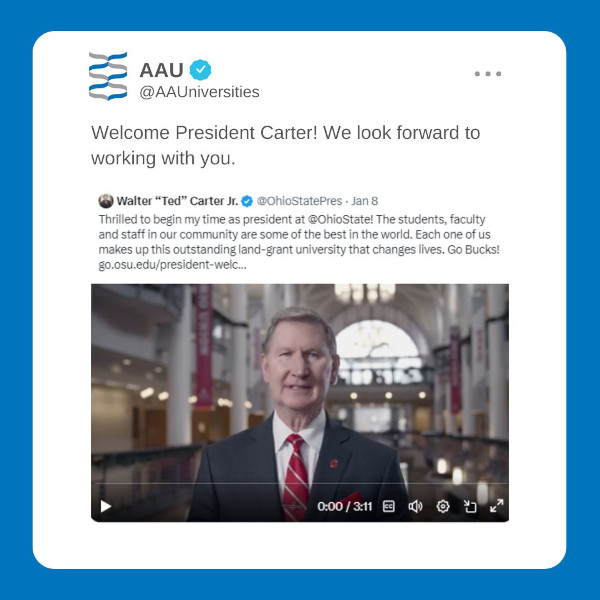 Congress Averts Partial Government Shutdown
Congress Averts Partial Government Shutdown
Last week, both the House and the Senate voted to pass a stopgap funding bill (H.R. 2872) to extend government operations into March. The bill sets a March 1 deadline to pass the FY24 Agriculture-FDA, Energy-Water, Military Construction-VA, and Transportation-HUD bills and a March 8 deadline to pass the remaining eight appropriations bills. The temporary measure does not include any supplemental funding or cuts to existing levels of funding. The House voted 313-108 to pass the bill, while the Senate passed it in a 77-18 vote. In the House, the bill passed with significant Democratic support; 106 Republicans voted against the legislation, indicating dissatisfaction with the bill within GOP ranks.
Earlier this month, Senate Majority Leader Chuck Schumer (D-NY) and House Speaker Mike Johnson (R-LA) reached a $1.66 trillion bipartisan deal to fund the federal government. However, lawmakers have yet to determine how to allocate the funds and write the 12 appropriations bills that implement the agreed-upon spending levels. According to Roll Call, Senate Appropriations Committee Chair Patty Murray (D-WA) and House Appropriations Committee Chair Kay Granger (R-TX) have been working “‘around the clock’ on the subcommittee allocations with the goal to finish them as soon as possible.”
 AAU Hosts Delegation of Leaders from the Indian Institutes of Technology
AAU Hosts Delegation of Leaders from the Indian Institutes of Technology
Earlier this month, AAU hosted a delegation of leaders from the Indian Institutes of Technology in Washington. AAU President Barbara R. Snyder joined the delegation along with several members of the AAU Task Force on Expanding U.S.-India University Partnerships. A number of government officials joined the meeting, including representatives from the White House National Security Council, the United States Agency for International Development, and the U.S. Departments of State, Defense, and Agriculture.
The meeting focused on how to implement the recommendations outlined in the interim report issued by the AAU task force last year to expand scientific cooperation and research collaborations between universities in the United States and India. Attendees discussed how AAU and our Indian partners – working with government research funding agencies in both countries – could facilitate new joint research ventures in critical areas such as semiconductor technology and manufacturing; sustainable agriculture and food security; sustainable energy and the environment; health equity and pandemic preparedness; and critical and emerging technologies (including AI, cybersecurity, and quantum science).
Following the meeting, AAU Senior Vice President for Government Relations and Public Policy Toby Smith participated in a keynote panel session at the IIT2024 Global Conference with several IIT leaders and a representative from the National Science Foundation. The session focused on the White House’s U.S.-India initiative on Critical and Emerging Technology (iCET) and efforts to grow the Indo-U.S. critical technology ecosystem. (AAU is coordinating its work on expanding U.S.-India university partnerships with iCET.) Panelists discussed what is being done to strengthen research partnerships between universities in the two countries and gave significant attention to AAU’s initiative.
 Chairwoman Foxx Introduces the College Cost Reduction Act
Chairwoman Foxx Introduces the College Cost Reduction Act
Earlier this month, House Education and Workforce Committee Chairwoman Virginia Foxx (R-NC) introduced the College Cost Reduction Act (H.R. 6951). According to Foxx, the wide-ranging bill “provides a comprehensive solution that will lower college costs for students and families.” Among other things, the bill would:
- Build off the College Cost Transparency and Student Protection Act to require the secretary of education to implement standardized financial aid offer forms.
- Establish a “Pell Plus” program, which would provide enhanced Pell Grants to students in their junior and senior years of college, “provided they are on track for on-time completion” and are enrolled in programs that offer high returns on student earnings.
- Cap undergraduate student loans at $50,000 and graduate student loans at $100,000 (loans for graduate professional programs would be capped at $150,000). The bill would also place a lifetime cap on the total amount of loans a student can borrow at $200,000.
- Replace existing student loan repayment programs with one income-driven repayment plan and another 10-year plan that is structured like a mortgage-payment plan.
- Require institutions of higher education to pay the government “a portion of the unpaid interest and principal on the loans associated with their former students.”
- Repeal a variety of existing regulations and require the secretary of education to confirm that “any new regulations or executive actions related to the student loan program will not increase costs to the federal government.”
A summary of the bill is available here; a fact sheet is available here.
Lawmakers Introduce the Protecting Students on Campus Act
Earlier this month, Senate Health, Education, Labor, and Pensions Committee Ranking Member Bill Cassidy (R-LA) and Sen. John Fetterman (D-PA) introduced the Protecting Students on Campus Act of 2024. The bill aims to “empower students to file civil rights complaints if they experience violence or harassment on college campuses due to their heritage.” Among other things, it requires colleges and universities that receive federal funding to inform students about how they can file discrimination complaints under Title VI of the Civil Rights Act of 1964 and to “report the number of civil rights complaints they receive and the actions they took to address the complaints.” A one-pager on the bill is available here.
News of Interest
The Conversation: Congress Is Failing to Deliver on Its Promise of Billions More in Research Spending, Threatening America’s Long-Term Economic Competitiveness – A little less than two years ago, Congress passed the CHIPS and Science Act and promised big federal investments in scientific research agencies such as the National Science Foundation. But congressional budget proposals for science funding this year “fall $5 billion to $7.5 billion short of what the CHIPS act called for in fiscal year 2024.” Putting science on the “chopping block” will not only “hurt U.S. leadership in critical technologies,” but will directly affect “people’s jobs, lives and the economy.”
KDVR: CU Boulder Instrument to Trek 1 Million Miles to Collect Space Dust – A team of students and researchers at the University of Colorado Boulder’s Laboratory for Atmospheric and Space Physics has created an instrument that NASA will use to collect space dust on its Interstellar Mapping and Acceleration Probe mission. Analyzing the dust particles, which are “the closest material we have for understanding the original building blocks of the solar system,” will help open “a new window to the universe,” said CU Boulder Professor of Physics Mihály Horányi.
USA Today: Education Department Speeds Up Relief for Some Student Loan Borrowers on Income-Based Plan – The Biden administration announced that borrowers enrolled in the Saving on a Valuable Education plan who originally took out $12,000 or less in student loans and have been making payments for at least 10 years will have their debts cancelled as early as next month. The relief comes “nearly six months ahead of schedule,” said President Biden.
The News & Observer: Exiting UNC, Guskiewicz Says He Was Called to Michigan State, Not Pushed Out of Chapel Hill – In an interview, former University of North Carolina at Chapel Hill chancellor Kevin Guskiewicz discussed his time at the university, including the many challenges he navigated during his tenure as well as his accomplishments. Guskiewicz stepped down as UNC’s chancellor last month and is joining Michigan State University as president on March 4.
Forbes: Washington University Forming Drug R&D Company with $130 Million Pledge from Deerfield Management – Washington University in St. Louis is launching a new initiative, VeritaScience, which will focus on “the discovery, clinical development and commercialization of promising therapeutic and diagnostic candidates with potential to benefit human health.” Healthcare investing firm Deerfield Management has “committed up to $130 million over the next 10 years to help fund the initiative.”
Featured Research

What’s in Your Bottled Water? Study Suggests There May Be Hundreds of Thousands of Tiny Plastic Bits
Researchers at Rutgers University and Columbia University used a “breakthrough microscopic technique” to count plastic in bottled water and found “that on average one liter of water contained some 240,000 detectable plastic fragments.”
Researchers Create First Functional Semiconductor Made from Graphene
Researchers at the Georgia Institute of Technology have created a new type of semiconductor that is made from “graphene, a single sheet of carbon atoms held together by the strongest bonds known.” The new semiconductor “could cause a paradigm shift in the field of electronics.”
From Our Feeds

On January 1 Walter “Ted” Carter Jr. began his tenure as president of The Ohio State University. Carter is the former president of the University of Nebraska System and is a retired vice admiral with 38 years of service. AAU welcomes President Carter. We look forward to working with you!